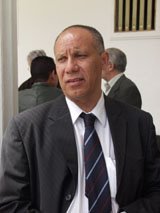 The first thing to note about LVA's barrage of counter charges is the timing. A month ago, before Interior Minister Jesse Chacón accused him of corruption, LVA was a model of revolutionary circumspection. Suddenly, finding himself on the back foot, he "discovers" not just that Chacón's banker brother is a crook, but also that there are any number of high level narco-corrupt dealings in the court system...which is ever so interesting because, lest we forget, this whole telenovela started when LVA was dismissed from his post as head of DEM, the Executive Directorate of the Magistrature.
The first thing to note about LVA's barrage of counter charges is the timing. A month ago, before Interior Minister Jesse Chacón accused him of corruption, LVA was a model of revolutionary circumspection. Suddenly, finding himself on the back foot, he "discovers" not just that Chacón's banker brother is a crook, but also that there are any number of high level narco-corrupt dealings in the court system...which is ever so interesting because, lest we forget, this whole telenovela started when LVA was dismissed from his post as head of DEM, the Executive Directorate of the Magistrature. The irony here is that DEM is the body in charge of supervising the court system, with extensive powers to investigate and sanction corrupt judges. Which begs the question...what was LVA doing about all this judicial corruption back when it was his job to stop that sorta thing? Nothing at all...except hoarding incriminating files on regime big-wigs as insurance against any future investigation.
"If I go down," he seems to have calculated, "a whole lot of people go down with me." Well, he's going down now, and he's not going down by himself.
First victim, MariPili Hernández, who will have to give up her job as vice-minister of Foreign Affairs after the Supreme Tribunal "disabled" her yesterday in a ruling penned by...you guessed it, Luis Velásquez Alvaray (cuz that's the other thing, as allegations fly back and forth, LVA is still a working Supreme Tribunal magistrate...por ahora.) Is MariPili guilty of whatever she's been charged with? Who can tell? Is the timing of LVA's ruling coincidental? Not a chance...
What's interesting, from an analytical point of view, is the way the whole culture of corruption inside the revolution makes it perilous to try to pick off individual figures. Too many people know too much. Deciding to crack down on a single baddie is dangerous, because he knows he can take down a dozen others, and he knows you know he can take down a dozen others, and he uses the fact that you know that as a "vaccine" against any probe.
Any number of high officials seem to be caught up in this dynamic, which is only stable if everybody stays quiet. And as corruption extends more and more throughout the upper echelons of the state, Chávez finds the only way to keep the whole apparatus stable is not to rock the boat. Because if you move against one player, one revelation leads to another, which leads to two more, in a metastasizing progression that doesn't have a natural limit.
We already saw something similar, though in a smaller scale, with the CAEEZ scandal, when an initial set of revelations about corruption in the Sabaneta sugar mill led on to revelations about state funding of Chavez's referendum campaign (Comando Maisanta) in Barinas. In that case, the government seems to have been able to limit the damage. But it's a precarious exercise...by nature, corruption investigations tend to grow in unsuspected new directions.
And that's a risk chavismo can hardly afford. The revolution may be able to survive one LVA/CAEEZ-type scandal, or two, or three. But if they start to multiply, eventually you can see how they might reach some critical threshhold where the whole of the upper government is implicated. And that's in no one's interest.
